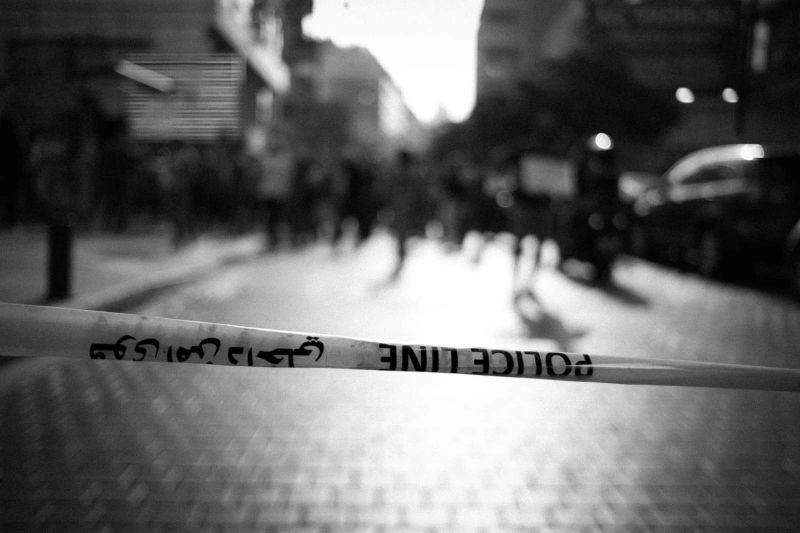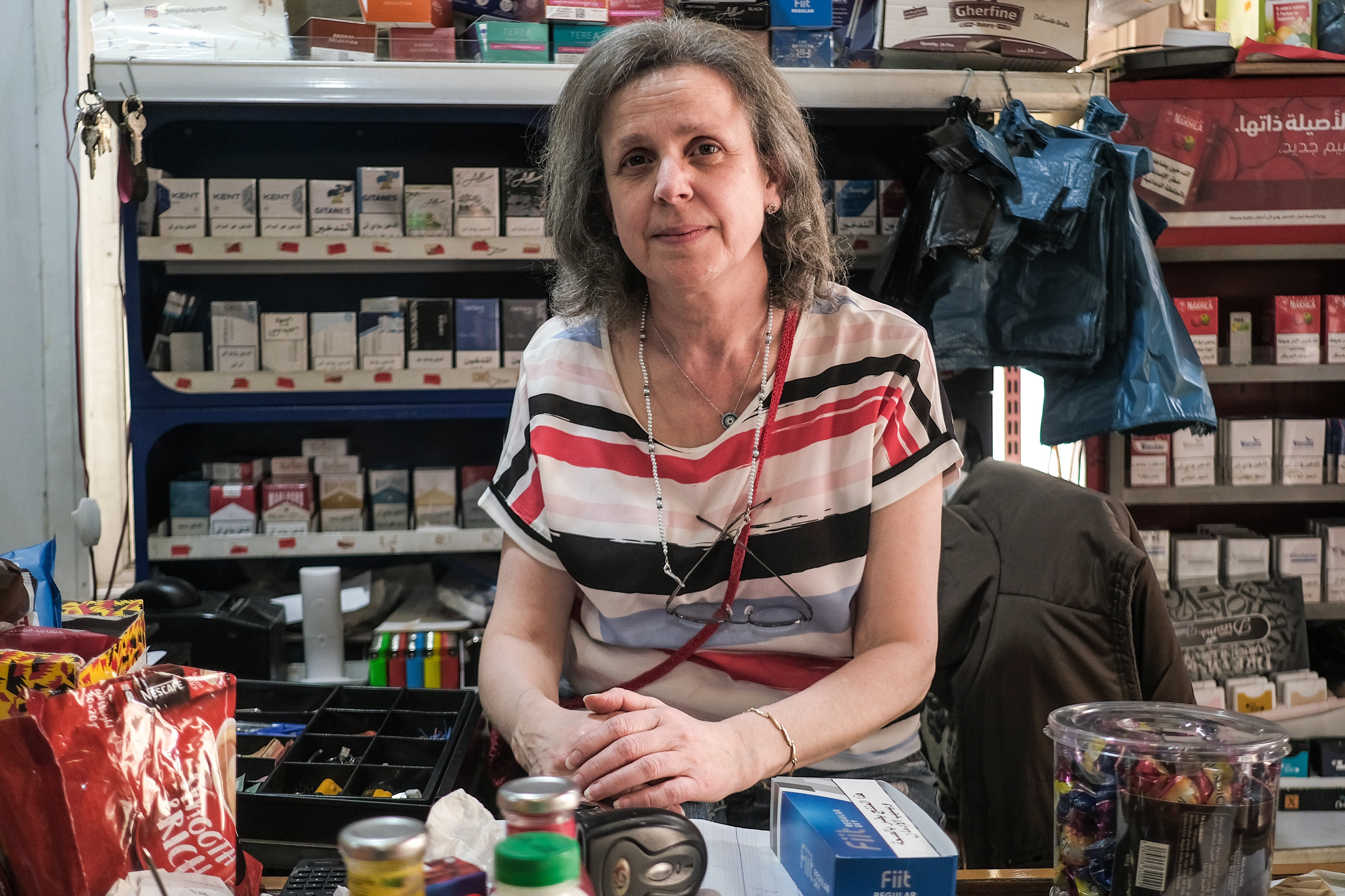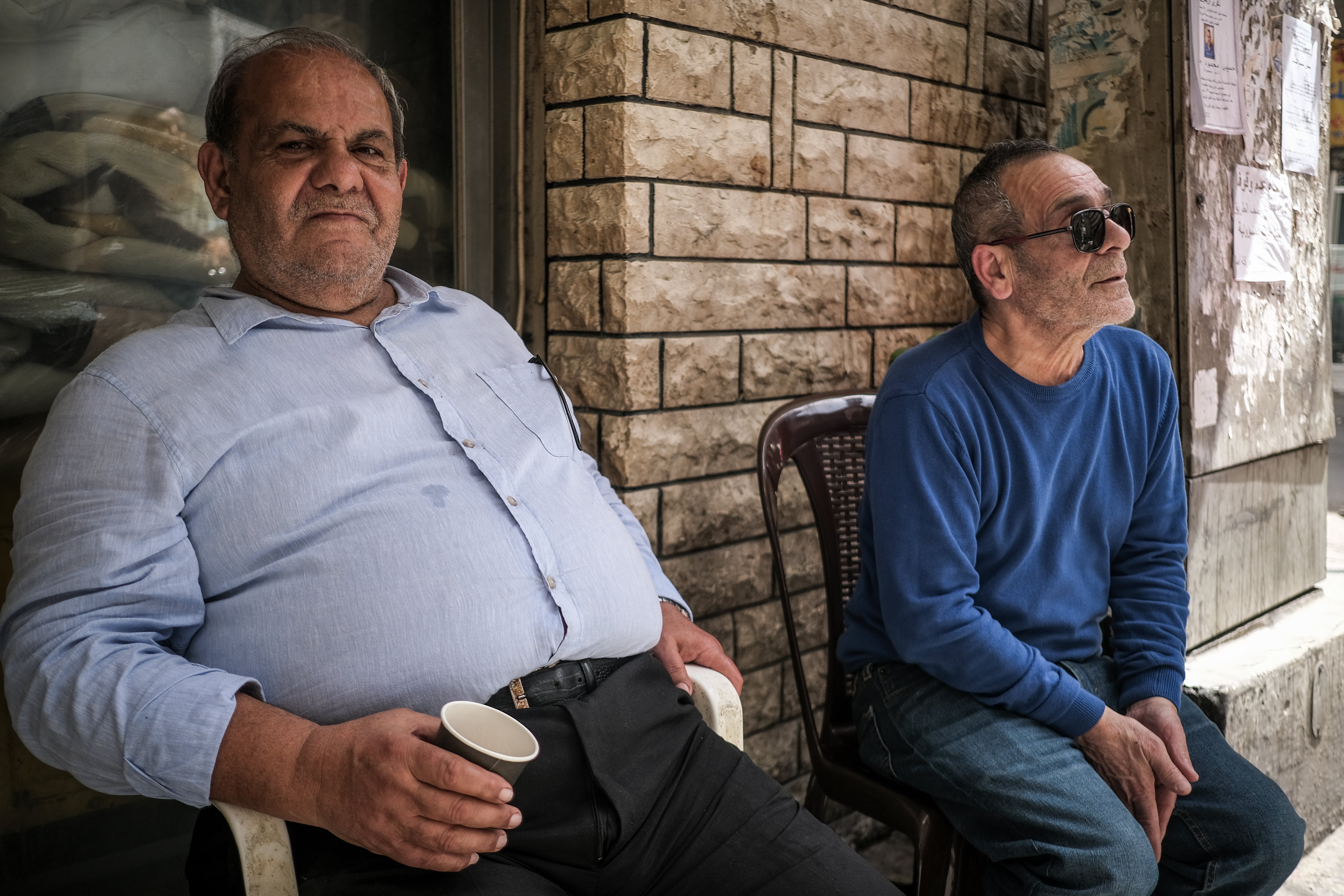
Illustration: Police yellow tape. (Credit: João Sousa/L'Orient Today)
BEIRUT—At 8:30 p.m., Wajdi Fayyad looked down the barrel of a gun aimed at him, the demand echoing in his ears: “Give me the money.”
Wajdi’s sister, Hanan Fayyad, seated at the counter of the family-run convenience store in Achrafieh, recounts the harrowing incident.
“I was standing where you were standing,” she gestures to a customer's usual spot. “The thief mistook me for a customer, so he didn't bother me.”
With little resistance, Wajdi surrendered LL5 million (around $56) from the register, his sister tells L’Orient Today.
Hanan says she remained frozen, munching on an apple and struggling to process what was happening in front of her, as the thieves vanished into the night last September.
Within the last year and especially in the last month, a number of violent crimes have hit the headlines in Lebanon. In late March three masked men, holding two guns, tailed and cut off a vehicle on the highway near Beirut’s Rafic Hariri international airport and stole $38,000 and LL127,000,000. A month later the body of a woman of American origin, who was murdered and dismembered in Mieh w Mieh, southern Lebanon was discovered. A couple of days later two young men shot a grocery store owner while trying to rob him in Achrafieh, Beirut.
Some people are blaming the perceived increase in crime on Syrian refugees and incompetent authorities and security agencies. But is that really the reason, and is Lebanon actually witnessing an overall surge in crime? What do the data, analysts, stakeholders and officials tell us?
Surge vs. exceptions
“The increase isn't drastic; crimes always occurred before,” Farouk al-Moughrabi, a lawyer and former senior advisor for the former Lebanese Minister of Human Rights, tells L’Orient Today. “It's not at a point where we've lost control.”
This was echoed by a security source at the Internal Security Forces (ISF), who told L’Orient Today, “It is not true that the crime rate in Lebanon is increasing.”
“The crimes that we sometimes hear about, like the ones taking place on the airport road, are exceptions, but generally the situation [today] is safer and crime is decreasing,” when compared to the peak of the crisis in 2021, the source added.
The number of crimes today “remains high” when compared to pre-crisis data issued by the ISF, but when compared to the rates of 2021 and 2022, “the peak of the crisis,” “the numbers have declined,” Mohammad Chamseddine, a policy research specialist at a Beirut-based research firm Information International, told L’Orient Today.
Chamseddine says the number of thefts increased by 268.94 percent from 1,610 in 2019 to 5,940 in 2021. “In 2023 that fell back to 3,152, a 33.9 percent decline”, he adds.
“Compared to 2013, which was considered to have been a stable year in Lebanon, the rate has significantly increased.” Chamsiddine suggests several contributing factors including the “rise in poverty and leniency of security agencies.”
Fears in an otherwise peaceful neighborhood
For victims of crime, like Hannan and Wajdi Fayyad in Achrafieh, nerves are high. Memories of the gun-wielding robbers are still fresh in their minds.
“A man waited outside for [the gunman] on a motorcycle. I could tell both were Lebanese by their accent,” she notes.
“My brother offered him groceries, anything, but the thief insisted on cash,” Hanan says, adding that she speculates the two were probably “drug addicts” for wanting “just money, and not accepting groceries.”
Despite Wajdi filing a complaint, ISF never followed up on the incident, Hanan says. It was difficult to identify the robbers, who wore a cap, sunglasses and a face mask, and were filmed by the store's camera.
 Owner of a convenience shop in Achrafieh, Beirut, Hanan Fayyad poses for a picture, April 24, 2024. (Credit: João Sousa/L'Orient Today)
Owner of a convenience shop in Achrafieh, Beirut, Hanan Fayyad poses for a picture, April 24, 2024. (Credit: João Sousa/L'Orient Today)
Asked about the incident, the security source at ISF said he did not immediately have information.
Instead of operating till midnight, Hanan says the shop closes early now, serving through a glass window after 7 p.m. They've also reduced the cash kept on-site.
She dreads another similar incident. She says if that ever happens again, she would do exactly what her brother did: “give him the money.”
‘Media sensationalism’
Lebanon’s caretaker Interior Minister Bassam Mawlawi said in a press conference on Wednesday that “the [number of] arrests made by the security services are on the increase, and all crimes will be solved,” without clarifying the timeline of the increase.
The comments were made following two high-level meetings on Wednesday aimed at examining the security situation in Beirut and putting in place “a clear security plan that reassures citizens,” as Mikati said.
One meeting took place between caretaker Prime Minister Najib Mikati and representatives of the security services, and another between Mikati and the Chairman of the Parliamentary Foreign Affairs Committee, Fadi Alameh.
The security source at ISF said that despite the rise in arrests in recent months, “it is not a strong indication that crime is on the rise.”
However, security agencies also cannot resolve crimes they are not reported on. Sometimes citizens avoid doing so due to either complex personal circumstances or a lack of trust in the competence of these agencies.
The meetings’ discussions also revolved around regulating the Syrian refugee situation. In recent months, Lebanese authorities have been intensifying efforts to repatriate Syrians amid rising tensions fueled by the killing of Lebanese Forces (LF) executive Pascal Sleiman. A Syrian “gang” was arrested in connection with the crime.
In a post on X on Wednesday, LF leader Samir Geagea called for stricter measures on Syrians, akin to those adopted by Britain. British Prime Minister Rishi Sunak promised on Monday to start sending asylum seekers to Rwanda within 10 to 12 weeks as the upper house of parliament finally passed the required legislation.
Meanwhile, another murder in the Aley village of Azzouniyeh, of a 60-year-old man, in the district of Aley, which two Syrian nationals were arrested for, led to the dismantling of two informal Syrian refugee camps on April 17: one in Bar Elias and the other in Marj, in central Bekaa.
In another incident, Syrian and Lebanese teenagers armed with stones, sticks and knives exchanged blows on Sunday evening in Dohet Aramoun, Mount Lebanon.
A week ago, Mawlawi said that Syrians who do not have “security reasons” for being in Lebanon cannot stay here.
Moughrabi, the lawyer, warned that media sensationalism around recent crimes, “like those in Achrafieh and the murder of Pascal Sleiman,” are being used by “politicians to push these kind of narratives and to exacerbate the tension between Syrians and Lebanese, hoping it would expedite Syrians’ deportation.”
“Syrian refugees have been in Lebanon since 2012,” Moughrabi said, questioning why a surge in crimes committed only by Syrians would “rise specifically now.”
In a new report released Thursday, Human Rights Watch (HRW) accused Lebanese authorities of arbitrarily detaining, torturing and deporting Syrians, including activists and army defectors, violating international human rights standards.
 A man drives his motorcycle in Beirut, April 24, 2024. (Credit: João Sousa/L'Orient Today)
A man drives his motorcycle in Beirut, April 24, 2024. (Credit: João Sousa/L'Orient Today)
‘Before, private security used to be a luxury, today, it is a necessity’
Jihad El Annan is the CEO of a private security firm, Metropolitan Security. He tells L’Orient Today employment at his company has increased by 30 percent since 2017 to respond to growing security risks.
“With the crash of the banking sector in Lebanon, people turned their houses and shops into banks… they started depositing their savings at home,” hidden in various house compartments or under heavy objects, Annan says, adding that people were compelled to heighten their security preparedness.
One way was to hire private guards.
“We get requests for buildings, towers, hospitals, hotels, embassies and even banks,” the CEO of the 24-year-old firm said. “The company covers mostly the Greater Beirut area, but has been receiving requests from all over the country, “especially for villas in the mountains.”
He says that requests over the last four years have “definitely increased,” but they do not have rough numbers by how much, adding that “before, private security used to be a luxury — today, it is a necessity.”
“Even the middle-income individuals and families are putting in the calls today,” he adds.
Based on his observation working in the security sector, Annan believes that “Lebanon is still safe, considering all the crises it’s been through and compared to other countries.”
He also speculates that “social media” has been playing a crucial role in “surfacing these crimes, many of which have always happened, and making them more visible to the public, who are made to conclude that crime is on the rise.”
Taking security into your own hands
Some people who cannot afford private security companies are finding means to protect themselves.
Bilal Janbieh, a 50-year-old man who works at a barber shop in Mar Elias, says that “the entire neighborhood is up and out at night here, it is not that scary yet.”
He has been living in Mar Elias for more than 30 years.
However, he pointed out the persistent issue of motorcycle theft in Lebanon and said certain markets and stores in his neighborhood offer space rental for around LL500,000 per month to motorcycle owners seeking overnight protection for their vehicles to prevent theft.
Sitting outside his laundromat in Mar Elias, Beirut, Imad says “for the most part, I still feel safe in Lebanon.”
 Two residents of Mar Elias, Beirut, Imad (L) and Ali Ayoub (R), sit outside Imad's laundromat and sip on tea, April 24, 2024. (Credit: João Sousa/L'Orient Today)
Two residents of Mar Elias, Beirut, Imad (L) and Ali Ayoub (R), sit outside Imad's laundromat and sip on tea, April 24, 2024. (Credit: João Sousa/L'Orient Today)
He has four children, one of whom works at a restaurant and returns home at late hours. “His mother insisted he carries a gun because of the [rising] crimes.”
“But the police ended up confiscating the gun,” Imad said. He blamed most of the crimes on the “economic crisis” and “Syrian refugees,” saying that “anyone would go down that road if they did not have money.”
His friend, Ali Ayoub, sitting next to him sipping on tea, says, “I used to live in California… I would never dare walk at night there. Here, at least you still can live normally.”